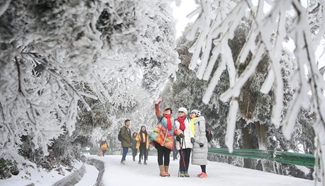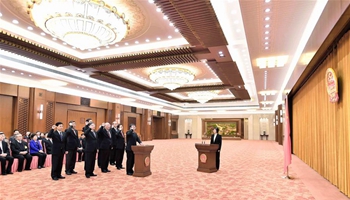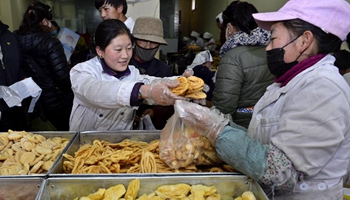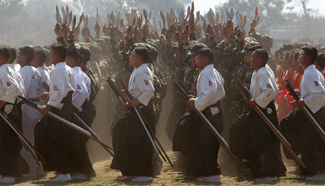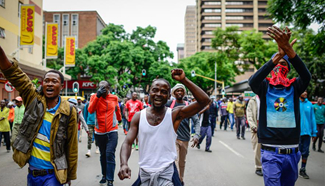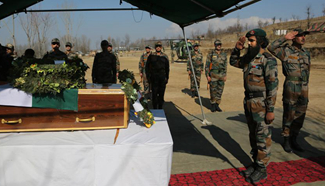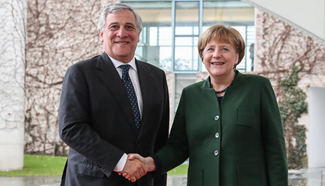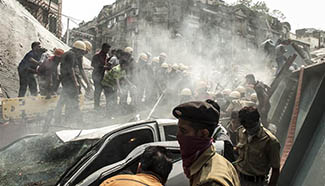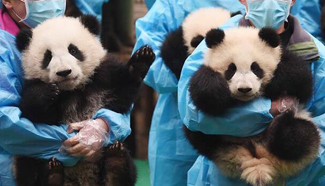BEIJING, Feb. 24 (Xinhua) -- As the president of the most populous nation on the planet, poverty has never been an issue Xi Jinping could take lightly.
In his four years leading China, Xi, 63, has visited more than 30 impoverished villages and townships, sharing his rich experience in poverty-eradication work and putting himself on the front lines of the war on poverty.
Looking back, it has been clear that Xi's deep understanding of and focus on the poor has developed throughout his political career, as he rose from being a young man working at a remote village in the northwestern province of Shaanxi, to China's top job.
He has often spoken of his first-hand experience living in poverty, and shared his ideas and insights on how to deal with it. For example, he said that relocation was an important approach in fighting poverty and highlighted the role of ecological compensation, which would help improve the environment and boost incomes.
Last month during an inspection tour in northern Hebei Province, the president said fighting poverty was the fundamental task for building a moderately prosperous society.
China has set 2020 as the target year to finish building a moderately prosperous, or "Xiaokang" society. A key goal of the targets is to eradicate poverty in China.
Xi has said that "no one should be left behind on the road towards Xiaokang."
FIRST TASTE OF POVERTY
Xi's first taste of poverty came in Liangjiahe Village in Yan'an, Shaanxi, about 48 years ago.
He was not even 16 years of age when he was sent to Liangjiahe in early 1969, as a result of Chairman Mao Zedong's campaign for urban youth to experience rural labor.
"Experiencing such an abrupt turn from Beijing to a place so destitute, I was struck deeply," Xi said, recalling the whole village turning dark at night as the only lights available were a few kerosene lamps by a ditch.
In less than three years, Xi became a completely competent rural laborer.
"I found myself easily traveling several miles of mountain road while carrying a shoulder pole weighing over 50-kilograms," he said.
However, a day of hard work barely earned him enough for a pack of the cheapest cigarettes, which cost nine cents in the 1970s.
A year's harvest could only sustain farmers for a couple of months, and they often found themselves running out of food as early as April or May. Xi and his contemporaries sent to work in the countryside were almost reduced to begging.
From 1988 to 1990, Xi worked as chief the Communist Party of China (CPC) of Ningde Prefecture in southeastern Fujian Province. Ningde used to be one of 18 contiguous poverty-stricken areas in China.
"During my one-year-and-11-month stay in Ningde, I went to almost all the townships, including three of the four townships without access to a paved road, " Xi said.
Xi recalled his tour to Xiadang Township vividly: "The township CPC Committee was built on a renovated cow enclosure, and a big crowd of us had to hold our meetings on a bridge."
Due to poor access, few higher-level officials went to Xiadang.
"I was the first prefectural CPC committee secretary who had ever been there," Xi said.
In 1997, Xi, then deputy secretary of the CPC Fujian Provincial Committee, visited Xihaigu, a region in the south of Ningxia Hui Autonomous Region, historically, even internationally, known for its harsh environment.
Declared "uninhabitable" for humans, by visiting experts from the United Nations in 1982, Xihaigu was left out of China's headlong rush to riches in the country's economic reform.
"The families I visited did not have enough to eat, and the drinking water -- salty to taste -- was fetched from afar," Xi said. The villagers did not even have the luxury of showering.
"It was my first visit to Xihaigu and the view of people's life there shocked me," Xi said. "After so many years of reform and opening-up, that there was still a place in such poor and difficult conditions left me stunned."
LEADING BY EXAMPLE
Xi's first-hand experience with poverty only encouraged him to eradicate it in China for good.
In Liangjiahe village where Xi worked for seven years from 1969, he was inspired by the success of Dazhai, a model village in neighboring Shanxi Province, where villagers had enough to eat through the hard work to harvest grain. Xi and fellow villagers of Liangjiahe dreamed of "having corn flour for meals" for the whole year, too.
"I just turned 20 at that time, and I was mainly thinking about ways to let everyone to harvest a little more grain and have a little pocket money," Xi said.
Xi led the villagers in digging wells, building terraces and sediment storage dams, and setting up the province's first methane-generating pit.
He also invited the village's three blacksmiths, who had been working elsewhere, to come back to set up an iron cooperative.
"Forging the iron could generate some income. Only by making some money could we get things done."
Among some 30,000 young people sent to the Yan'an region from Beijing, Xi was the first to work as a Party branch secretary at that time. He was awarded a three-wheeled motorcycle by the Beijing municipal government.
"The motorcycle was useless in the village. It was even impossible to drive it into the village. Better to exchange it for something practical," Xi recalled.
He then went to the agricultural bureau of Yan'an and exchanged the motorcycle for a hand tractor, a flour milling machine, a grain thrower, a rice milling machine and a submersible pump, for villagers.
RURAL REFORM IN ZHENGDING
Reform took an early root in Xi's thinking about governance.
From 1982 to 1985, Xi served first as deputy secretary and then secretary of the CPC Zhengding County Committee in Hebei.
"The household contract responsibility system had not been put into place when I arrived," Xi said.
At the core of China's last round of rural reform, the household responsibility system meant farmers could be allocated land by contract and were entitled to any surpluses to the market or retain them for their own use.
In 1983, the secretary of Lishuangdian Commune proposed to pilot the system on a piece of land in his jurisdiction.
"Both I and another deputy secretary of the county committee supported him. One year after, only his commune reaped a good harvest compared with the ordinary output elsewhere," Xi said. "Suddenly all the people in the county said this seemed to be a viable way, and the system finally got widely implemented."
"At that time, Zhengding was a pure agricultural county. I proposed to pursue diversified economic development and a 'semi-suburban' economic model since the county is close to Shijiazhuang," Xi said. "The county [government] set up an office for diversified economy, and I was concurrently the CPC County Committee's deputy secretary and the office's director."
"The five communes south to the Hutuo River had done a good job. Many people went to work in Shijiazhuang by bike in the morning," Xi said. "In the Shijiazhuang markets, the vegetables were produced in Zhengding, those who were selling brooms and simple furniture were from Zhengding, and the guardians of the boiler rooms and the gates were also from Zhengding."
FUJIAN'S SHED & SMALL BOAT RESIDENTS
When working in Fujian, Xi often visited families that had lived in thatched sheds and small wooden boats for generations, and would ponder how to lift them out of poverty.
"Most of the fishing boats were in a dreadful state, without electricity or water supplies. The boats were low, gloomy and damp. Certain fishermen who did not have a boat just made shacks, where it was hot in summer, cold in winter, and hard to shelter from wind and rain," Xi said.
After doing research, Xi submitted a report to the CPC Fujian provincial committee, proposing resettling those living in thatched sheds and small boats.
"Communist Party members must have no peace of mind, day and night, to see people living in such poor conditions," he said when presiding over a meeting in 1998 to address the problems.
Due to Xi's proposal, in a few years several million people bid farewell to an unstable life.
The CPC attached great importance to coordinated development between the advanced and underdeveloped regions of the country. Fujian, for instance, was tasked to assist the development of Ningxia Hui Autonomous Region.
Xi was in charge of the assistance as he worked as deputy secretary of the CPC Fujian provincial committee.
"We are a socialist country. Having taken the first steps to prosper, the coastal regions in the east should not leave other areas alone. We need to achieve common prosperity," Xi said.
Within the framework of counterpart assistance, wells were dug and cellars built to store water for drinking and irrigation in Ningxia.
Xi encouraged researchers in Fujian and Ningxia to develop technology to improve potato yields. Residents in Xiji County, southern Ningxia, saw their incomes increase after planting potatoes and selling them to Fujian businesses.
The Fujian government also supported Ningxia to relocate people from impoverished areas. As a pilot project, several thousand families moved from Xihaigu to a better area near the regional capital, Yinchuan.
"The measure proved effective and we created a sustainable path," Xi said.
MAKE TARGETED EFFORTS
Whatever Xi's position is, he has always highly valued precision in poverty alleviation.
"You should not bomb fleas with grenades," Xi said, stressing that money should be spent in the right place.
In late 2013, Xi visited a remote village in central Hunan Province, where he met only seniors, children and women, as the young and robust had left to work in cities.
"I figured, how could they possibly pursue any major projects. So I said we might as well get you some 'legs' -- several black pigs, cattle and goats for every household. The senior villagers were very pleased, saying it was exactly what they wanted," Xi said.
Back when Xi served as deputy Party chief and governor of Fujian Province, he proposed "making real efforts to help the really poor."
Since he became the Party's leader in 2012, he has insisted on seeing "real poverty" every time he has reached an impoverished region, such as Fuping county in Hebei Province, Huayuan county in Hunan Province and Dongxiang Autonomous County in Gansu Province.
"In some localities, people have the misconception that poverty relief goes hand in hand with industrial projects. [But] in deep mountains and forests, where there are no professionals or market, and costs are high, it is not easy to develop industrial projects," Xi said.
Poverty relief is all about solving real problems, according to Xi.
He stressed the importance of education and guaranteeing basic public facilities, such as roads, water and power.
He also suggested teaching those in poverty "how to fish" in accordance with their actual conditions and capabilities.
"The elderly can raise chickens, ducks and sheep. Give them some fine breeds, guide them on proper feeding, and offer some financial support. For young people, it is important to help them find jobs. [We] train them, and instruct them to find employment outside their homes," Xi said.
He has warned against aiming too high, saying that tasks should be accomplished one by one.
Xi has called for saving children from poverty, in particular, by granting them access to education.
"In poor regions, improving education should be a priority. Children should be given a fair chance at the starting point of their lives. Give them opportunities to be educated, to go to college. Then in eight to ten years, they will have the means to become well-off, or at least to feed themselves," Xi said.
He has demanded more financial support be given to education in remote and rural areas, and that the development of compulsory education receives due attention.
Teachers could be sent on a rotating basis to poor mountainous areas, Xi said, suggesting offering teachers better pay and greater opportunities for promotion.
To move people out of poverty, Xi believes, it is crucial to instill in them an aspiration to live better.
From 1988 to 1990, Xi was secretary of the CPC Ningde Prefectural Committee in Fujian.
"I saw Ningde as a weak bird that needed to make an early start, work with perseverance and not feel ashamed of lagging behind. Work incessantly and it will eventually take on a new look," Xi said.
Some of Xi's speeches in Ningde were later compiled into a book titled "Out of Poverty," which Xi said could serve as a guideline.
"For those in poverty, a lack of morale will get them nowhere," Xi said.
"In the battle against poverty, no corruption, fraudulence or blind pursuit of political achievements can be allowed," Xi said, adding that secretaries of the CPC county committees or county magistrates should work at the very frontline and make concrete efforts.
Only with a down-to-earth style and concrete efforts can cadres fulfill the promises of eliminating poverty made to the people and to the history, according to Xi.
Xi has stressed that the task of poverty relief, which tops the Party and the country's work agenda, must be assigned to the most capable cadres. Secretaries of the CPC county committees and county magistrates could only be transferred to other positions after their poverty relief work is proved.
He has highlighted the importance of inspection and supervision in poverty relief, stressing that the effect of poverty elimination work of one place should be evaluated by officials from other places to ensure impartiality and the assessment result would be an important yardstick for cadre promotion.
Related:
Xi stresses precision in battle against poverty
President Xi Jinping underscored the importance of precision in the battle against poverty, saying that poverty relief targets should be accomplished as scheduled. Full story
Xinhua Insight: Xi's new year inspection shows poverty relief high on China's policy agenda
BEIJING, Jan. 27 (Xinhua) -- As most Chinese are busy preparing for Spring Festival, China's top leader this week was in the snow-covered grassland of northern China, facing the country's arch enemy. Full story




